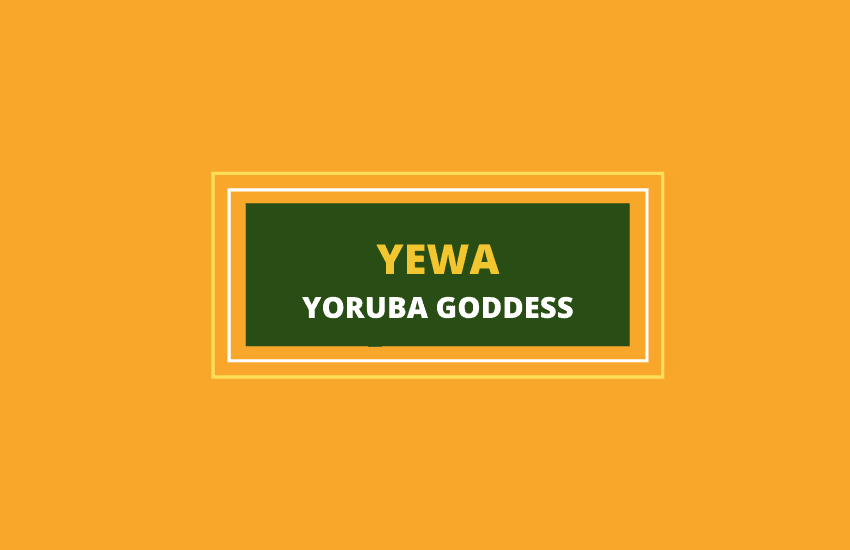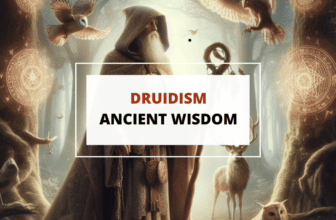
Table of Contents
In the Yoruba religion, Yewa holds a place of honor among the deities that guide and watch the steps of the dead in the afterlife. Yewa is the goddess of virginity and death, and as such, she is widely associated with cemeteries, reclusiveness, and decorum.
It’s believed that Yewa resides inside graves, accompanying the deceased, and that she is always prone to punishing those who disrespect the cult of the dead. Regardless of this, in the past, Yewa was mainly worshipped as a water deity, even having one of the longest Nigerian rivers (the Yewa River) consecrated to her.
As a major Yoruba deity, Yewa had many symbols and attributes associated with her. Let’s take a closer look at this popular Orisha and why she was important in the Yoruba pantheon.
Who is Yewa?
Yewa is one of the goddesses of the Yoruba pantheon, a religion which originated in West Africa and nowadays is practiced primarily in southwest Nigeria. Originally, Yewa was considered a water deity, but as time went by, she began to be associated with the notions of chastity and decorum.
The goddess’s name is derived from the combination of two Yoruba words, Yeyé (‘Mother’) and Awá (‘Our’). But, since Yewa is consistently described as a virgin goddess in Yoruba mythology, the meaning of her name might be a reference to the deity’s role as the protectress of all the virgins.
Yewa is the daughter of Obatala, the god of pureness and clear thoughts, and Oduduwa. The latter, despite being mentioned as the brother of Obatala in most myths, is also sometimes portrayed as a hermaphroditic deity, (or even as the female counterpart of Obatala). Like her father, Yewa takes very seriously her pursuit of purity.
Due to the trans-Atlantic slave trade that occurred between the 16th and the 19th centuries, the Yoruba faith arrived in the Caribbean and South America, where it eventually transformed into several religions, such as the Cuban Santería and the Brazilian Candomblé. In both of them, Yewa is seen as a goddess of death.
It’s worth mentioning that Yewa is also the name taken by a subgroup of the Yoruba people from the Ogun State (Nigeria), that were formerly identified as the Ẹgbado.
Attributes and Symbols of Yewa
First considered a water spirit, Yewa eventually became known among the Yorubas as the virgin goddess of morality, reclusiveness, and decorum. Moreover, the Yoruba people commonly regard Yewa as a beneficial deity, who guards over the innocents. However, the goddess can also dispense suffering to those who disrespect her cult.
Yewa is also associated with death. She is supposed to be the protectress of cemeteries. There, according to a Yoruba myth, Yewa dances over the tombs of the deceased, to let the dead know that she is protecting them. It’s said that sometimes Yewa turns into an owl to carry on with her guardian duties without being noticed by humans.
Both intelligence and diligence are also among the attributes of Yewa. She is considered to be a wise and knowledgeable deity, who works hard and favors industriousness.
In terms of symbols associated with Yewa, the goddess is commonly linked to pink veils and crowns made of cowrie shells. These two objects represent the nobility and the chastity of the deity. As one of the goddesses of death, Yewa is also connected to gravestones.
Yewa in Yoruba mythology
According to Yoruba mythology, from early on Yewa decided to devote her life to chastity, so she abandoned the world of mortals and remained isolated in her fathers’ crystal palace. But one day, news of a beautiful virgin goddess that was hidden in the residence of Obatala reached the god Shango. Being the orisha of fire and virility, Shango couldn’t avoid feeling excited about possessing the mysterious Yewa.
Eventually, Shango sneaked into the majestic gardens of Obatala, where the goddess used to take short walks, and waited for Yewa to show up. A little while later, the virgin appeared, inadvertently letting Shango appreciate her divine beauty. However, when Yewa saw Shango, she experienced love and passion for the first time. Confused and ashamed by her emotions, Yewa left the gardens and went back to her father’s palace.
Regardless of the physical attraction that the god had inspired in her, Yewa remained a virgin. However, feeling ashamed for having broken her vow of chastity, the goddess went to her father and confessed to him what had happened. Obatala, being the god of purity, knew he had to reprimand her for her fault, but since he also loved Yewa very much, he was hesitant about what to do.
Eventually, Obatala decided to send Yewa to the land of the dead, to be the guardian of the deceased. This way, the goddess would be helping human souls, while still being able to maintain her chastity vow, since no god would dare to go there simply to tempt Yewa.
According to Santería tradition, this is how Yewa became responsible for taking the egguns (‘the spirits of those who had recently died’) to Oya, Yewa’s sister and another goddess of death.
Prohibitions Regarding Yewa’s Cult
In the Yoruba religion, there are certain prohibitions that those who are initiated in the mysteries of Yewa have to comply with. First of all, Yewa’s priests and priestesses can’t eat any food that comes from the sea. However, dishes made of fish can be used as offerings to appease Yewa.
During the adoration of the goddess or when the initiates are in front of the images of Yewa, it’s strictly forbidden for them to engage in any sexual activity, start a fight, scream, or even speak with a tone of voice that can be considered as loud.
Yewa in Yoruba Representations
In most Yoruba representations, Yewa is depicted wearing either a pink or a burgundy dress, a veil of the same color, and a crown made of cowrie shells.
Sometimes the goddess is also portrayed holding a horsetail whip and a sword. These are the weapons that Yewa uses to punish those who do wrong to chaste people or make fun of the dead.
Conclusion
An important deity in Yoruba mythology, Yewa is the orisha of the river. In the Cuban Santería, a faith derived from the Yoruba religion, Yewa is also worshipped as one of the goddesses of death.
Most of the time, Yewa is regarded as a beneficial deity, but the goddess is rather severe with those who disrespect either her cult or the cult of the dead.








